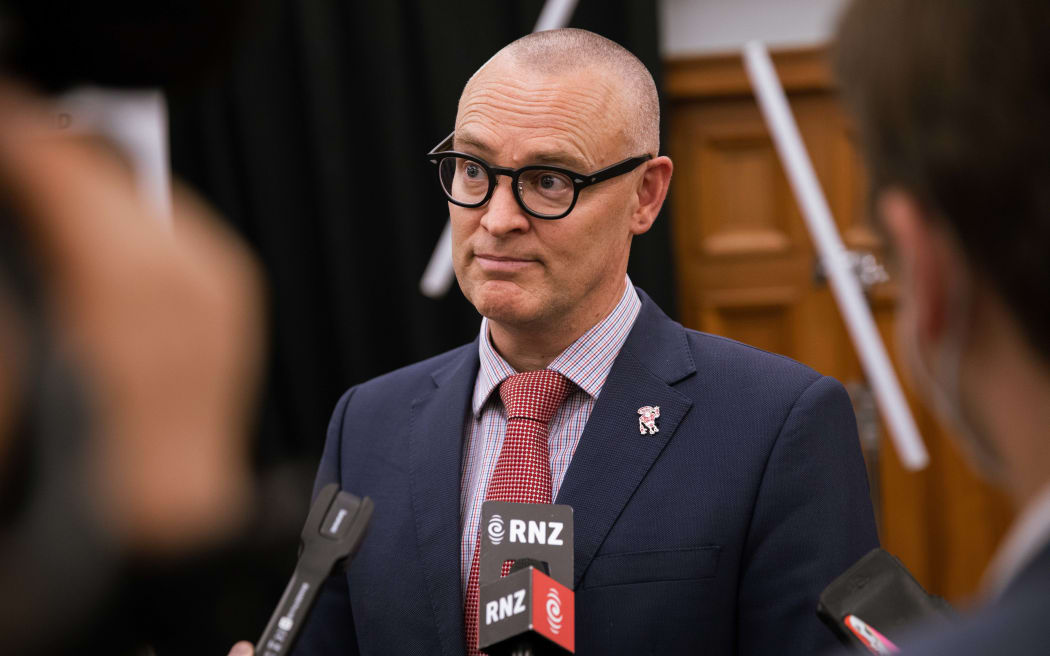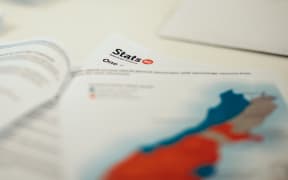Stats New Zealand is rejecting criticism that law changes will erode its independence, saying it is at best a misunderstanding, or else misleading.

Statistics Minister David Clark says the law change does not give Stats NZ sole control over government data, nor expand the scope of information gathering by agencies. Photo: RNZ / Angus Dreaver
Former chief statistician Len Cook has launched broadsides at the bill that is before Parliament, warning it opens the way for Stats' powers to be transferred to other agencies, with no controls or limits, and for wider data collection.
Constitutional lawyer Sir Geoffrey Palmer and former Stats minister Maurice Williamson have voiced similar criticisms.
The Council for Civil Liberties is calling it "a dangerous piece of legislation" designed to promote "a wholesale grab of New Zealanders' data so that it can be shared for ill-defined 'research' purposes or worse".
Chief Ombudsman Peter Boshier warned in his submission the bill would erode his office's independence by obliging them to provide data, and report on compliance with standards, to Stats NZ on request.
Statistics Minister David Clark has now pushed back, saying the law change did not give Stats NZ sole control over government data, nor expand the scope of information gathering by agencies.
Deputy Government Statistician Dr Craig Jones told Morning Report the delegation powers were not new, and they had no plans to use them anyway.
They had been able to do that since 2013, under changes to the State Sector Act, Jones said.
"We've never done it in the past to my knowledge ... we have no plans to delegate anything in the short, medium or long term."
However, Jones added he could foresee a situation where it might delegate to the likes of the Education Ministry or MBIE, if it were closer to industry, and better placed to set data standards.
"That's a hypothetical scenario where it might occur."
The bill provided more transparency around that and made it clearer that enforcement functions could not be delegated, Jones said.
It "doesn't mean that you're passing it over to someone without restriction".
"The government statistician would still retain accountability for any decision that the delegate took."
The bill would not change the set-up, whereby the minister could direct Stats NZ what data to collect, but not tell it how to do that.
However, Cook said he stood by his criticism, saying he was familiar with this type of legislation and had taken a close look at the bill before speaking up.
Civil Liberties Council chair Thomas Beagle called on MPs to stop or at the least amend the "overreaching" bill, such as by dropping the new data-sharing section entirely.
"It will do serious damage to public trust in government by turning Statistics NZ into a data broker," Beagle said, echoing Sir Geoffrey who had raised the "spectre" of surveillance.
Beagles said the desire to "collect it all" seemed to be copied from big internet companies.
It would create a "massive data store" within which individuals could be easily identified by the police and SIS.
The critics, however, say there is no rush and the bill needs a rethink.
Dr Jones said the primary purpose was to modernise the 1975 Stats Act, and Clark repeated that.
"The bill provides for greater leadership of an official statistics system in which we increasingly work across government to produce statistics," Clark said in a statement.
He declined an interview with RNZ.
"It only allows for data to be collected for producing official statistics and research. It also maintains the act's confidentiality and privacy requirements," he said.
It would modernise how Stats NZ assessed requests to access data for research, and there would be greater use of administrative data around "the day-to-day activities of public sector agencies, businesses, and community groups", which was consistent with international trends, Clark said.
As for delegating, the bill required Stats NZ to publish information about this.
"The government statistician continues to have statistical independence, ensuring production and release of official statistics free from political interference," the minister said.
"This is a fiercely guarded democratic convention that will be strengthened through the passing of this legislation."
Transparency International NZ called for withdrawal of what it labelled "bad and unbalanced legislation".
It was a "step backwards for transparent and open government", chair Anne Tolley, a former National government minister, said in a statement.
It fractured the longstanding constitutional divide between statistics and policy making, and there was no urgency to pass it, the statement said.
Transparency NZ agreed with Beagle that the bill got the trade-off "wrong" between privacy and well-informed decision-making.
"We urge Parliament to withdraw this bill."


